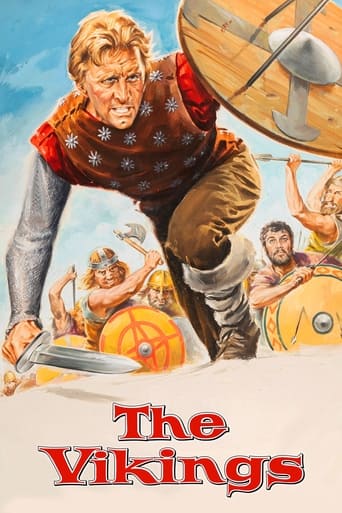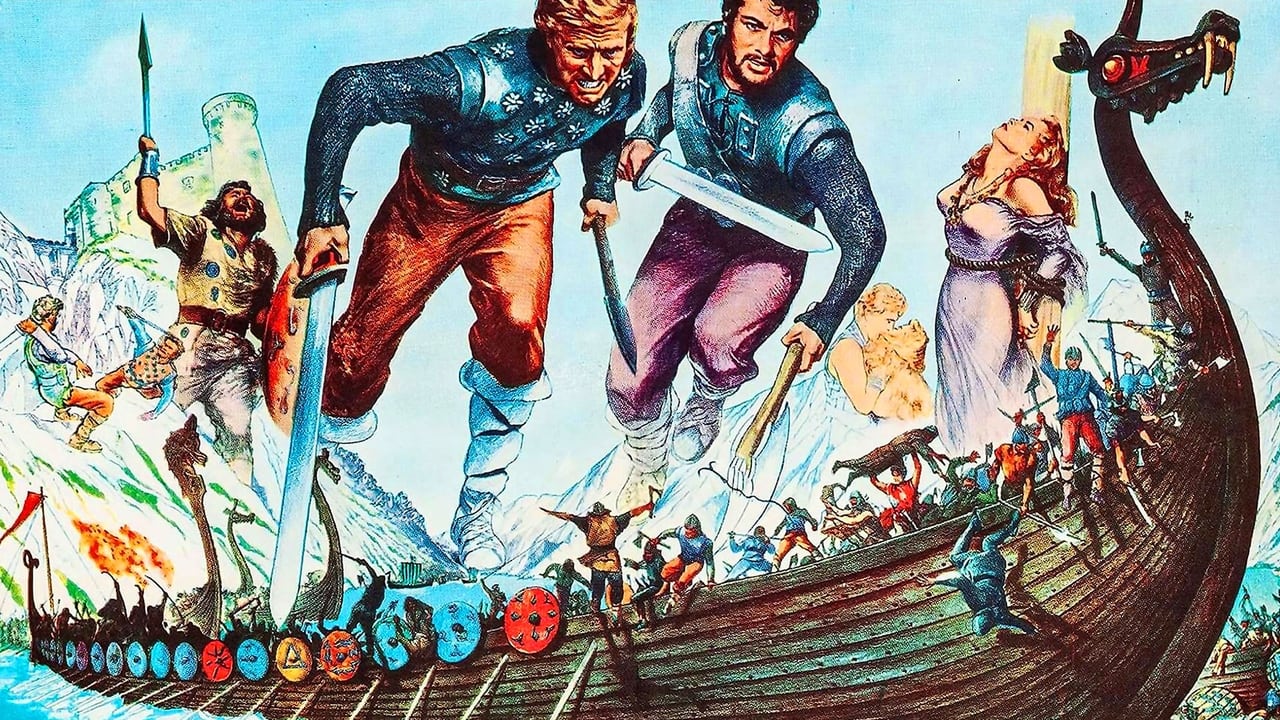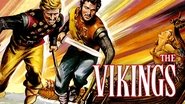jpdoherty
United Artists THE VIKINGS (1958) is one of the great epics of the fifties. Based on the book "The Vikings" by Edison Marshall it was produced by Jerry Brasler for Bryna Productions (Kirk Douglas' own company which he named after his mother).Beautifully photographed in Technirama and Technicolor by ace British cinematographer Jack Cardiff more than 4000 multinational performers and technicians worked on the giant production. Filmed on actual locations in the mountains and fjords of Norway the picture is well remembered for its scenic beauty and authentic sets. The splendid screenplay was put together by Dale Wasserman and Calder Willingham and Richard Fleischer directed with a deft hand an all star cast. The picture is also notable for the fine polished narration spoken by an uncredited Orson Welles. Ragnar (Ernest Borgnine) is the savage Viking chieftain who with his Viking horde rape and pillage along the English coast. On one such raid he rapes an English Queen who later gives birth to a boy they call Eric (Tony Curtis). But his existing son Einar (Kirk Douglas) is unaware he has a half brother and grows to hate Eric especially after the Vikings attack an English ship and abduct the princess Morgana (Janet Leigh) whom both sons desire. Sometime later Eric rescues the princess from the Viking camp and in a small boat makes a dash for England with Ragnar and Einar in hot pursuit. During the chase Ragnar's ship goes aground in the fog but Eric saves him, pulls him aboard and takes him to England as well where the treacherous king Aella sentences Ragnar to die in the dog pit. Later Eric returns to Norway to muster Einer and his men to attack the English castle where Morgana is being held and to avenge Ragnar's death. The picture ends in a marvellous set piece as the Vikings take the castle after a blistering well staged battle and Eric and Einar battle it out to the death in a terrific sword duel atop the dizzying castle parapets.Performances are superb from the entire cast. Douglas himself is a standout in his own production. His facility for knockabout action is a joy to behold. His prowess and unerring skill at stunts is well revealed in THE VIKINGS exemplified in the taking of the castle sequence. Here Douglas, under fire from rocks and arrows, charges and leaps across the open moat grabbing onto the axe handles which his men had already thrown and embedded in the underside of the raised drawbridge. Then using the axes to grip he clambers up and over to let the bridge down. It is a stunning and spectacular piece of stunt work! Again in an earlier scene Douglas can clearly be seen doing what is known as Dancing The Oars whereby he hops from oar to oar outside the ship for the amusement of the camp. Excellent too was Tony Curtis! Here was the emergence of Tony Curtis the ACTOR which manifested itself in Burt Lancaster's "Trapeze" (1956), with Lancaster again in "Sweet Smell of Success" (1957) and then in "The Defiant Ones"(1958). Gone were his pretty boy days at Universal International the studio he started with and where he would become their top pinup male star alongside a young Rock Hudson and Jeff Chandler. Also a standout in THE VIKINGS is Ernest Borgnine giving a powerful portrayal of the Viking leader Ragnar - a part he was born to play. Others in smaller roles are good too such as Alexander Knox as the Friar, Frank Thring as the sly and dubious Aella, James Donald as Egbert the English traitor and Janet Leigh (Mrs. Curtis at the time) as the princess.My only problem with the movie is the staid and laboured music score by Italian composer Mario Nascimbene a composer who never really distinguished himself in anything he did. Despite the haunting and echoing motif that sings out the two words of the film's title on a giant elephant tusk the colourless tinny sounding score is quite insipid and uninspired. It is surprising that a composer the calibre of Miklos Rozsa or Dimitri Tiomkin - two men who could score such epics in their sleep - were not approached to work on Douglas' picture. Their involvement would have added immeasurably to the film giving it a greater buoyancy and density. However, the score not withstanding THE VIKINGS is still a great movie and remains one of cinema's finest blockbuster epics.
qormi
Excellent movie. Kirk Douglas was at his very best portraying Einar, the Viking prince. Curtis, Borgnine, and Janet Leigh all were excellent. Many great moments in the film..Tony Curtis telling his falcon, "Kill"..with devastating results. The wolf pit. A drunken Einar throwing an axe at a maiden or jumping across the oars of a Viking ship. Lots of imagination went into the making of this film and the characters were definitely not wooden, as they are in most historical epics. From the very beginning, the movie grabs you and keeps your interest until the very end. Images of Kirk Douglas as Einar scaling the castle walls by grabbing axe handles, crashing into a sacristy and shoving the priest aside, saying "Out of my way, Holy Man"..pretty intense stuff. A masterpiece.
James Hitchcock
"The Vikings" is essentially an epic, even if it is rather shorter than most films in that genre, set in the Dark Ages rather than the more normal worlds of the Bible or the Greco-Roman classics. The story is loosely based upon Norse sagas (legendary, but with a basis in the real history of ninth-century England) about the struggles between the pagan Vikings and the Christian Anglo-Saxons for control of the Kingdom of Northumbria (today's northern England). Some epics from the fifties, such as "The Robe" or "The Silver Chalice", took the simple view of the "Chanson de Roland" that "Christians are right and pagans are wrong", but not this one. The film's main villain is the cruel and treacherous Christian King Aella and the Vikings, while fierce and warlike, nevertheless have their own code of honour. As was common with epics, the plot is a complicated one. It revolves around a pair of half-brothers, Erik and Einar, the sons of the Viking chieftain Ragnar. Erik is also, unbeknown to him, the long-lost rightful heir to the Northumbrian throne currently held by Aella. (Northumbrian laws of succession must have been rather loose. Erik is the son of the widowed queen of Aella's cousin and predecessor, who conceived him when she was raped by Ragnar- a rather daring storyline in the days of the Production Code. Such a parentage would not have given Erik a claim to the throne of most European monarchies). For most of the film the two men do not know that they are brothers- indeed, they regard one another as rivals and enemies, a rivalry intensified when both fall in love with the same woman, the Princess Morgana, who also happens to be betrothed to Aella. Ragnar, Erik, Einar and Aella were all historical individuals, but the film is not noted for its historical accuracy. Indeed, because the history of this particular period is so sketchily recorded, any film about it would be bound to involve more speculation than hard fact. In reality the Vikings and their Saxon enemies, both Germanic peoples, had much in common, apart from in the area of religion, but in the film the two sides are portrayed as being quite culturally distinct. The Vikings are shown as Dark Age barbarians, whereas the Saxons are portrayed as having a much more advanced culture, with their architecture, armour and costumes being those of the High Middle Ages, several centuries after the date at which the events depicted ostensibly take place. If, for example, the Saxons had had stone castles like the one shown here, they would have had much less difficulty in repelling the Viking raids. Kirk Douglas not only starred in the film (as Einar), he also produced it, a double he was to repeat two years later with "Spartacus". Apparently creative differences led to Douglas falling out with the director, Richard Fleischer, with whom he had previously collaborated on "20,000 Leagues under the Sea", both blaming the other for what they saw as the film's failure. I was, however, surprised to learn this, as I have never considered "The Vikings" to be a failure at all. Certainly, it was a major success at the box office. Fleischer was a director whose films varied widely not only in subject-matter but also in quality. He made a number of films far worse than this one, "Red Sonja" being a particularly egregious example, and only a few better, notably "Ten Rillington Place". "The Vikings" combines exciting adventure with an engaging human drama, and is wonderfully photographed by the famous cinematographer Jack Cardiff against some striking natural scenery, mostly in the Norwegian fjords, although Aella's castle is actually in Brittany and some other locations are in Croatia. (Cardiff also worked as a director, and was later to make his own Viking epic, "The Long Ships"). Douglas and Tony Curtis as Erik both make dashing heroes, and there are also good performances from Curtis's real-life wife Janet Leigh as the lovely Morgana, Ernest Borgnine as Ragnar and Frank Thring as the villainous Aella. (Curtis and Leigh also starred together in another mediaeval drama, "The Black Shield of Falworth"). The film may not quite have the depth or grandeur of "Spartacus", one of the finest epics ever made, but judged by virtually any other standards it is a pretty good one. 7/10
wbbartlett
I have no problem with historical epics being inaccurate, after all they are not documentaries. I really like Braveheart, even though its historical nonsense. But don't be fooled by reviews that suggest this film is thoroughly researched and something close to history, because it's not.Like others I also remember watching this movie when I was young so I thought it would be good to watch it again. It didn't come up to scratch as far as my memory remembered it. The acting was wooden and the background singing laughable - like something out of a Monty Python movie. Maybe try it again in another forty years but for now it will be consigned to the deepest recesses of my mind where hopefully I will forget it.



 AD
AD







